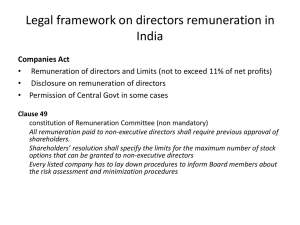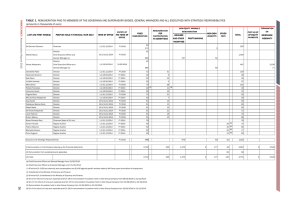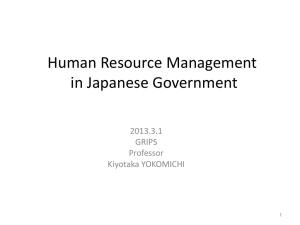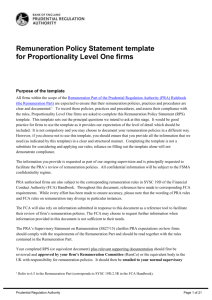Group Remuneration Committee
advertisement
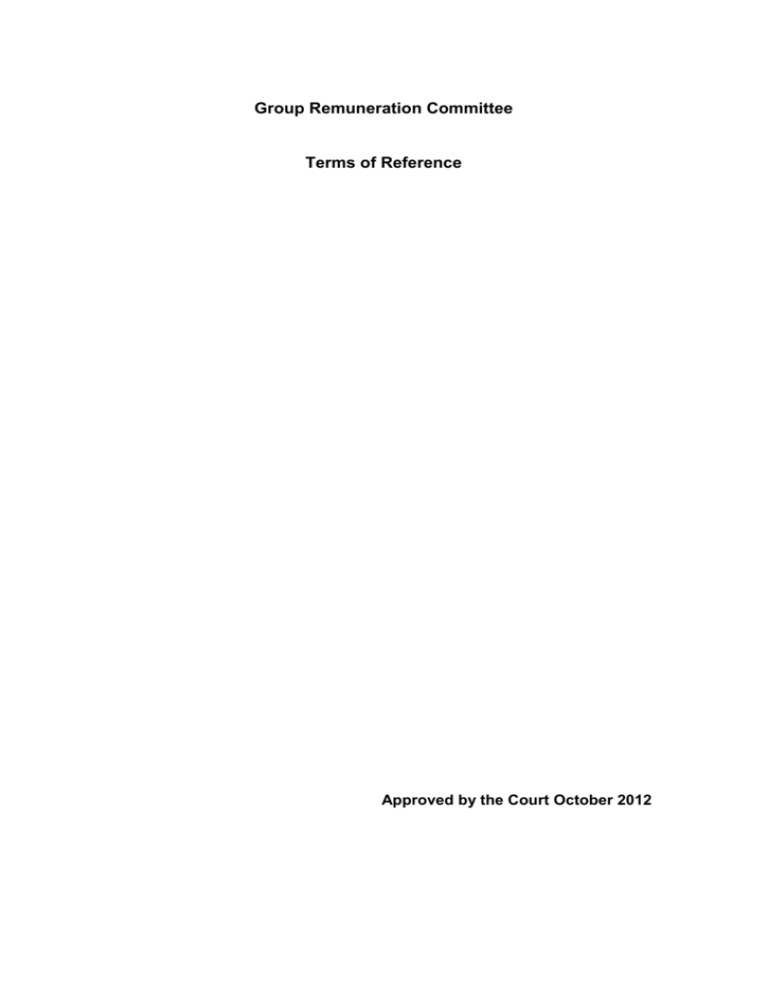
Group Remuneration Committee Terms of Reference Approved by the Court October 2012 Group Remuneration Committee Terms of Reference 1. Objectives This is the Committee of the Court responsible for ensuring that the Group’s overall reward philosophy is consistent with achievement of the Group’s strategic objectives. The Committee is responsible for the oversight of Group-wide remuneration policy with specific reference to the Governor, Directors and senior management across the Group, and those employees whose activities have a material impact on the Group’s risk profile and for considering and making recommendations to the Court in respect of same. In framing remuneration policies, the Committee shall give full consideration to the principles and provisions of the UK Corporate Governance Code and to Schedule A to that Code. In addition, remuneration policies may differ to reflect local geographical and regulatory requirements. The Committee will be responsible for ensuring that the Group operates remuneration policies and practices which are, where possible, in line with the principles of the EU Capital Requirements Directive (CRD III), and any associated guidance from the European Banking Authority (EBA) as to its application. Certain restrictions arise under the Transaction Agreement which constrains the Bank’s ability to be fully in line with these principles and guidance. In addition, the Committee is responsible for ensuring that the reward structure for GEC members supports the objectives of the Transaction Agreement and associated letter from the Minister for Finance or any other relevant agreements with the State. The resultant policies will be reviewed regularly by the Committee and will be recommended to the Court for ratification. 2. Membership 2.1 The Committee will comprise a minimum of three independent non-Executive Directors who have the skills and experience to reach an independent judgement on the suitability of the policies, including implications for risk and risk management. Membership and chairmanship of the Committee will be reviewed by the Court each year on the recommendation of the Group Nomination and Governance Committee in consultation with the Chairman of the Remuneration Committee. While there is no fixed term of membership, no more than three consecutive years would be expected from members. The general aim is to change the membership from time to time to ensure an appropriate balance between continuity and fresh perspectives. 2.2 The Governor may serve on the Committee as an additional member (but not chair) if he or she was considered independent on appointment as Governor. 2.3 The Group Chief Executive shall not be a member of the Committee but shall be in attendance as required. The Group Secretary shall be secretary of the Committee. 2.4 At least one member of the Committee will also be a member of the Court Risk Committee. 2.5 Each year the membership of the Committee will be displayed in the Annual Report and Accounts. When a Director, who is a member of the Committee, stands for reelection at the Annual General Court (“AGC”), his/her membership of the Committee will be noted on the proxy forms issued to stockholders. 3. Meetings and Quorum 3.1 The Committee will meet as often as it deems necessary for the discharge of its responsibilities. 3.2 The quorum for meetings shall be three members. 3.3 Any member of the Committee who has any personal interest in the matters to be considered by the Committee must so declare that interest and must absent himself/herself from any meeting while such issue is being considered. 4. Duties Without limiting the generality of the Committee’s objectives and given that neither the members of the Court nor the Committee participate in discussions or decisions relating to their own remuneration, the Committee shall; 4.1 Oversee the annual review of the Group Remuneration Policy with input from the relevant risk management functions and the Court Risk Committee 4.2 Determine, after consultation with the Court, the Group Chief Executive’s annual performance assessment and remuneration terms. 4.3 Determine the total remuneration package of the Governor, each Executive Director and Senior Executives, as defined from time to time by the Court including : salary; variable payments; stock options and awards; service contracts; pension benefits. In their deliberations, the Committee will have regard to the ongoing appropriateness and relevance of the remuneration policy, relevant market comparisons and practice, together with any other relevant guidance. The Committee’s deliberations will also, where appropriate, be informed by a reasonable assessment of the Group’s risk profile, financial situation and future prospects based on input from the Court Risk Committee. 4.4 Noting of remuneration of heads of control functions and senior risk management and compliance officers 4.5 Consider the implications of compensation policy/commitments for Executive Directors and senior executives in the event of early termination, in order to ensure that any such payments are fair, reasonable and appropriate to all parties 4.6 The remuneration of Non-Executive Directors of the Court shall be a matter for the Governor in consultation with the Group Chief Executive, the Group Secretary and the Head of Group HR. Such fees will be determined by the Court itself (nonExecutives not participating in the decision). 4.7 Review annually the level of Board fees paid by subsidiary Boards and recommend to the Court, increases (if any), to be proposed to the Board of that subsidiary. 4.8 Review annually and where they exist; (1) all long term incentive arrangements and employee share schemes operated in the Group (2) the level of Staff Stock Issue (SSI) in ROI and Stock Incentive Plan (UK) (3) general pension increases being considered for all pensioners. 4.9 Determine the powers delegated to any Management Remuneration Committees and consider the minutes of their deliberations. 4.10 Annually review the remuneration policy for all Group staff and in particular review the basis of the overall remuneration of the top earners within the Group and all staff identified as code staff each year. 4.11 Approve any contract of employment or related contract, and any proposed amendments to these (including salary changes), for any Executive Director or for the Governor. 4.12 Consider and recommend to the Court policy on stockholder disclosure and related matters for all remuneration issues including the contents of the Directors’ Remuneration Report contained in the Annual Report and Accounts. Ensure that such disclosure is clear and transparent. 4.13 Review a number of possible scenarios to test how the remuneration system will react to future external and internal events. 4.14 Perform any other duties or responsibilities relating to remuneration issues delegated to the Committee by the Court from time to time. 4.15 Review, on an annual basis, the Committee’s Terms of Reference and recommend to the Court any amendments thereto. 5. Authority 5.1 The Committee will operate under delegated authority from the Court and the Chairman will report to the Court on the Committee’s proceedings after each meeting. Committee minutes will also be circulated to the Court. 5.2 As and when required the Committee may access professional advice and may commission both informal and formal remuneration studies to assist its formulation of remuneration policy. 5.3 The Committee will seek relevant advice from the Court Risk Committee where appropriate, for example, in considering incentives which are based on future revenues whose timing and likelihood are uncertain. The Chief Credit & Market Risk Officer will be invited to attend at least one Committee meeting per year to report on the Group’s risk profile, its financial condition and future prospects, and to consider the implications of remuneration policies for risk and risk management within the Group. On the occasion of his/her presentation to the Remuneration Committee, the Chairman of the Court Risk Committee will be invited to attend the Remuneration Committee meeting. 5.4 The Committee may invite any Director, Executive or other person to attend any meeting(s) of the Committee as it may from time to time consider desirable to assist the Committee in the attainment of its objectives. The Committee is authorised to seek any information it requires from any employee of the Group to enable it discharge its responsibilities. 6. Performance Evaluation 6.1 On a yearly basis, the Committee shall review the effectiveness of its operations and report to the Court on its findings and recommendations. October 2012
